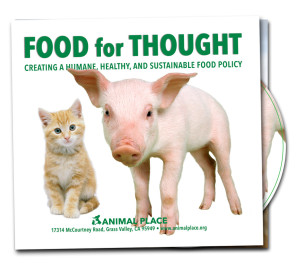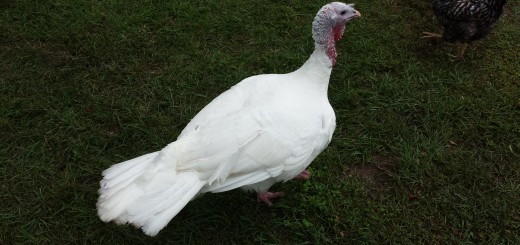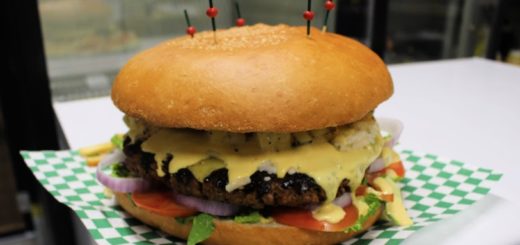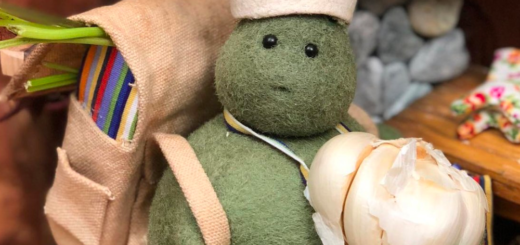Food for Thought Campaign Asks Animal Rescue Groups to Go Vegan
Eating animals while claiming to love them is a contradiction in terms, yet it’s how our country operates. Every year, we spend $60 billion coddling our companion animals, while simultaneously killing 10 billion+ farm animals for food.
And while it’s one thing for the general public to love fried chicken, it’s another for a bird rescuer to be gnawing on a drumstick.
Sadly, lots of rescue groups and shelters still haven’t made the connection between pets and other non-human animals. But thanks to Animal Place, the numbers of vegan sanctuaries and rescues is rapidly increasing.
The California-based sanctuary launched the Food for Thought campaign back in 2013, and its goal is to help animal-focused organizations adopt animal-friendly menu policies for their various events.
“Launching Food for Thought has been a long-time vision of our executive director, Kim Sturla. Twenty-five years ago, a piglet named Zelda inspired Kim to co-found our wonderful sanctuary,” explains Carolyn Mullin of Food for Thought.
“At that time, Kim worked as the director of a humane society when she first encountered Zelda. The staff at the humane society eagerly looked for a wonderful home for Zelda at the same time they munched on ham sandwiches. That lack of a connection between saving animals and serving them on a plate inspired Kim to work on farmed animal issues.”
The campaign is endorsed by more than 100 shelters and organizations, and has actually convinced more than a few to change their ways, including, according to Mullin:
- “East Bay SPCA, adopted a veg policy for all three locations following a meeting with Animal Place
- St. Martin’s Animal Rescue (Oregon) has adopted a vegan menu policy after having no policy.
- Second Chance Animal Welfare Center (Vermont) has adopted a vegan menu policy after having no policy.
- Animal Rescue, Inc. (Maryland) adopted a formal vegan policy, after not having one in place.
- The Humane Society of Silicon Valley (Bay Area, California) has improved their policy so that all vegetarian meals at their annual Gala are in fact vegan.
- Virginia Federation of Humane Societies adopted a policy that calls for animal-friendly options ‘with the goal of moving to a plant-based menu.’ This federation has (62) active organizational members.
And we’re actively in communication with several dozen other shelters who are considering improving their offerings,” she adds.
They’re also working to have three regional coordinators in various parts of the U.S. to work more closely with shelters in these areas — and Canada, too.
Because those of us who love animals the most definitely shouldn’t eat them.
You can learn more about the Food for Thought campaign on its website.

















Though this is a good idea and a way to help understand the man animal relationship, it can discourage those who help animals from doing so because the “Vegans” will look down on them as “hypocrites”. That is not the direction to go. I personally am not a “vegan fan” (and again I emphasize “personally”). The term vegan was coined in 1944 by Donald Watson when he co-founded the Vegan Society in England, at first to mean “non-dairy vegetarian” and later to refer to “the doctrine that man should live without exploiting animals. The key term here is EXPLOITING” animals. Using eggs, making butter, drinking milk is not exploiting animals in the general sense. Now how some people or industries get the products is another matter. Someone who is a “Vegetarian” (lacto-ovo) . one who does not eat animal flesh is someone who also has the best interest for animal treatment. So my point is, whatever our stand is on this topic, tread lightly on those people who want to help, rescue, donate money or time. towards helping animals. Remember those people are the voice for the animals also……so let’s not lose a single person.
Hi Robert,
Thanks so much for your thoughtful input. I totally agree about treading lightly and respecting all people who help animals, in whatever capacity. Every rescuer is making the world a better place! The thing is, the Food for Thought campaign is doing exactly that. There’s no negativity or judgment involved. They’re only asking animal rescue groups to voluntarily stop serving animal products at fundraisers, events, etc., as a way to help people make the inter-species connection. Sadly, the egg and dairy industries are just as cruel (some would argue more so) than the meat industry, so advocating for an end to using animal products is the best way to insure that all creatures are treated with kindness and respect. While the term “vegan” may have a negative connotation because of a strident few, really, it just refers to a lifestyle that embraces compassion for all forms of life. Again, thanks for your input — it’s appreciated!
The term “vegan” has a “negative connotation” because 1) meat eating is embedded in our culture on may levels and in many contexts, but is especially associated with power, domination, control of nature, and the maintenance of existing power hierarchies, so that “compassion” for the weak is itself associated with weakness; 2) our society is politically controlled by huge corporate interests, including animal agriculture, whose profits are threatened when the cruelty involved in mass producing meat is exposed; 3) the open admission of the cruelty involved in raising and slaughtering animals for food would threaten to expose a very fundamental paradigm of power that is essential to maintaining that hierarchy. There is a lot of emotional work that goes into justifying the horrors “we” visit upon animals in the name of our own self interest.
All true Joyce! Thanks for sharing — you make excellent points that are important to raise.